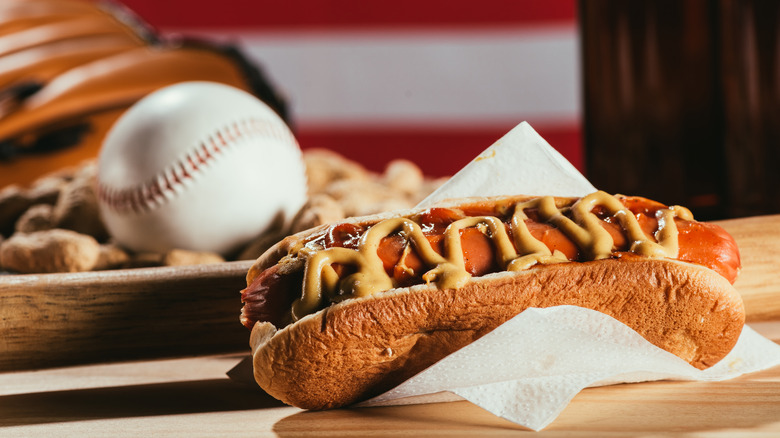Cured Vs. Uncured Hot Dogs: What's The Difference?
With the Fourth of July right around the corner, you may already be planning on how to celebrate. From large grilling parties to family firework gatherings, it's a fun and festive holiday that many enjoy. If you plan to grill, you have options, and hot dogs are one of the most common. According to USA Today, some of the best foods for the summer holiday are hot dogs, hamburgers, and wings.
According to the Hot Dog website (yes, they have their own website), wieners are much like cakes. Many recipes include various ingredients, textures, and flavors that suit different people's tastes. Even the hot dogs themselves may have additives and other ingredients blended into them. These additives increase flavor and prevent the meat from spoiling and growing bacteria. Preservatives must be inspected and approved by the FDA and USDA for safety.
When choosing your wieners, choose carefully. Some are cured, and some are uncured. Do you know the difference and why it's important? Grab your charcoal because we're going to break down those differences so you can plan your holiday menu.
What are cured hot dogs?
Most of the hot dogs you eat at backyard barbecues and baseball games are cured, according to Herald-Standard. These are the most common types of hot dogs. Cured wieners contain artificial preservatives called nitrates and nitrites that help prevent the meat from going bad. Preservatives enhance the flavor and color of the dog, too. Sounds okay, right? It's not.
Researchers Małgorzata Karwowska and Anna Kononiuk in their paper "Nitrates/Nitrites in Food—Risk for Nitrosative Stress and Benefits" (via National Library of Medicine) states that nitrates and nitrites are linked to toxicity, thyroid problems, and cancer. According to Mayo Clinic, these preservatives may also put you at risk for heart disease.
Cured hot dogs are fully cooked and ready to be warmed. That's why they can be tossed onto the grill in a snap or zapped in the microwave for just a few seconds. The USDA states that you may store your franks for up to two weeks in the fridge if they don't have a "best by" date. Do not freeze hot dogs for more than two months, and store opened packages of hot dogs for up to one week in the fridge. Hot dogs can be left safely at room temperature for up to two hours.
What are uncured hot dogs?
Uncured hot dogs don't contain artificial nitrates and nitrites. Instead, the meat is preserved with the naturally occurring nitrates in celery juice or powder. According to McGill University, celery juice contains high levels of natural nitrates. When treated with a bacterial culture, the juice produces nitrites which can be used to preserve the "no nitrates or nitrites added" processed hot dogs you love. According to Dr. Eric Berg, DC, the non-synthetic element of celery-created nitrites is "probably better," but the celery juice used to "cure" hot dogs isn't usually organic, if that is a concern for you. The celery is usually sprayed with pesticides and other chemicals, and the juice itself may not be any better than the actual synthetic nitrates used in cured hot dogs. When asked which dog he'd choose, Dr. Berg said he'd still go with the uncured hot dog.
Uncured hot dogs are fully cooked like cured hot dogs and can be quickly grilled, microwaved, or cooked on the stove or in the oven. Remember to always keep uncured hot dogs refrigerated and store them in the refrigerator according to the USDA's recommendations.
When it comes to selecting the fare for your gathering, the choice is yours. Stay informed and choose the type of hot dogs that you feel are best for your family.


